COVID-19

Voting Rights Reform Blocked, Biden Supports Sentencing Disparity Fix: June 23 Joint Center Roundup
Biden Administration
Biden administration endorses bill to end longtime drug sentencing disparity: President Biden endorsed the Eliminating a Quantifiably Unjust Application of the Law Act, or Equal Act, which if passed, “would end the disparity in sentences between crack and powder cocaine offenses.” In 1986, then-Senator Biden crafted the bill that mandated “a five-year minimum sentence for trafficking in 500 grams of cocaine or 5 grams of crack,” making the sentencing for crack 100 times more severe than it is for cocaine despite crack being derived from cocaine. NPR Addiction Correspondent Brian Mann said “federal data show that law wound up primarily targeting Black and Hispanic Americans, who sometimes spend decades behind bars, even for nonviolent drug crimes.” In 2010, Congress narrowed the disparity from 100-to-1 to 18-to-1.
The new bill is sponsored by Senators Richard J. Durbin (D-IL) and Cory Booker (D-NJ), but it faces opposition from some Republicans who want to close the gap by increasing sentences for powder cocaine.
Combating gun violence: President Biden announced his strategy to “stem the flow of firearms used to commit violence, including by holding rogue firearms dealers accountable for violating federal laws; support[ing] local law enforcement with federal tools and resources to help address summer violent crime; invest[ing] in evidence-based community violence interventions; expanding summer programming, employment opportunities, and other services and supports for teenagers and young adults; and help[ing] formerly incarcerated individuals successfully reenter their communities.” Axios reports that President Biden’s strategy could put him “at odds” with activists who have called for shifting resources from police to other government programs.

Marcia Fudge explains student debt hinders Black homeownership: Department of Housing and Urban Development (HUD) Secretary Marcia Fudge acknowledges student debt as a hindrance to homeownership for Black communities—“we’re the people who carry most debt. And so the system’s already skewed toward us not being creditworthy.” Fudge notes how homeownership is tied to generational wealth for Black people and disproportionately low rates of Black homeownership drove HUD to “reassess student loan calculation policies when determining homeowner assistance, which will increase homeownership access for communities of color.”
Black leaders attend White House roundtable on the Equality Act: Domestic Policy Advisor Susan Rice, Director of the Office of Public Engagement Cedric Richmond, and Director of the Gender Policy Council Jen Klein hosted a roundtable with LGBTQ+ advocates who are coordinating the national movement to pass the Equality Act. Two of the five advocates attending were key Black leaders—Human Rights Campaign President Alphonso David and National Women’s Law Center President and CEO Fatima Goss Graves.
The Hill
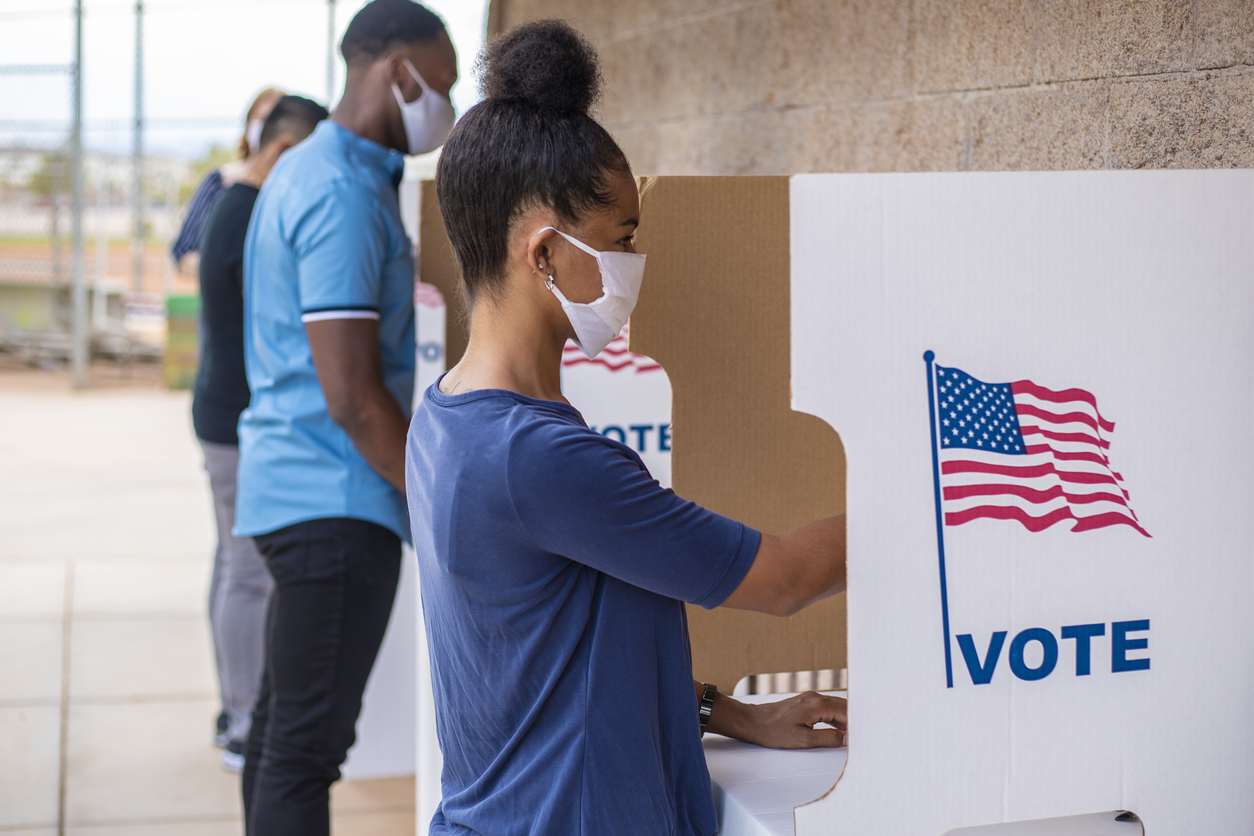
Senate Republicans block Manchin compromise voting rights reform: Since record voter turnout last year, states like Georgia have been enacting voting restrictions, and congressional Democrats have responded by introducing reforms to protect voting rights in federal elections such as the For the People Act (summary here). However, on Tuesday, Republicans blocked the legislation from coming to Congress, and didn’t seriously consider Senator Joe Manchin (D-WV)’s compromise proposal which would modernize voter registration, provide two weeks of early voting, expand mail-in voting, and make Election Day a federal holiday, but would also require voters to provide identification using documentation like a utility bill. Senate Republicans were able to block the federal voting rights protections because of the filibuster, and the question remains whether Democrats need to push for filibuster reform.
Joint Center President Spencer Overton appeared on NPR’s All Things Considered to discuss the issue. “Bipartisan election reform depends on whether the future of the Republican party is controlled by those who use government to restrict the freedom to vote and prevent competitive elections, or those who want to use the concepts of limited government and free competition to reach out to and appeal to an increasingly diverse America. In the 1960s we saw the Democratic party undergo such a realignment by squarely rejecting the Southern Dixiecrats and joining with many Republicans to pass the Voting Rights Act of 1965.” Click here to hear the full 6-minute interview with Spencer.
Democrats seek nationwide Medicaid eligibility expansion: Democrats push for new ways to pass an expansion of Medicaid eligibility in the 12 states that have “so far refused to do so,” leaving 2.2 million low-income people left without coverage. Members from the Congressional Black Caucus, Congressional Hispanic Caucus, and Congressional Asian American Pacific Caucus wrote to President Biden last week urging Medicaid expansion in the American Families Plan. Legislation to “entirely federally run Medicaid programs in the holdout states or expanding the Affordable Care Act’s marketplaces to give heavily subsidized private coverage to people falling through the cracks” are some of the major ideas being discussed.
Infrastructure plan makes slight progress: The bipartisan group of Senators coming up with an infrastructure compromise are moving closer to an agreement on a proposal but continue to “wrangle” with a way to pay for their $579 billion plan “in the face of White House opposition to indexing the gasoline tax to inflation.”
CBC will continue fighting for justice after Juneteenth victory: Members of the Congressional Black Caucus and racial justice advocates alike say “much more needs to be done” after the Senate and House passed legislation with “unanimous consent” to make Juneteenth the country’s 12th federal holiday. Voting rights, police reform, reparations, and Black immigrant protections are among the “legislative priorities that have failed to attract anywhere near the kind of bipartisan support,” but “remain issues to be overcome.” CBC Member Rep. Mondaire Jones (D-NY) says last week’s action was a “good first step” but urges the government to “go further to protect Black immigrants from being unjustly deported” and, alongside other advocates, calls on the Biden administration to extend Temporary Protected Status “which gives deportation relief and work permits to citizens of designated countries in crisis.” According to the CBC, “Black immigrants represent 5 percent of the undocumented population, but make up 20 percent of those facing detention or deportation for criminal convictions.”
Mental health & the COVID-19 pandemic: Bipartisan lawmakers are calling for “legislative action to help tackle addiction and mental health needs” exacerbated by the COVID-19 pandemic. Congresswoman Jahana Hayes (D-CT)—who’s a member of the Congressional Black Caucus’s Youth Suicide and Mental Health Task Force—told The Hill that “we can’t talk about suicide and addiction without talking about housing, healthcare, nutrition, and all of the stressors and underlying factors that create this ripe, fertile ground for people to become susceptible.”
Supreme Court upholds Obamacare: Last Thursday, Obamacare gained another victory on a 7-to-2-vote in the Supreme Court after six members of the court joined Justice Stephen G. Breyer’s stance that the Republican-led states and individuals who sought to repeal the health care law “had not suffered the sort of direct injury that gave them standing to sue.” Removing Obamacare would have “expanded the ranks of the uninsured in the United States by about 21 million people,” including “low-income adults who became eligible for Medicaid under the law after most states expanded the program to include them” and “young adults whom the law allowed to stay on their parents’ plans until they turned 26 and families whose income was modest enough to qualify for subsidies that help pay their monthly premiums.” For Black people aged 0 to 64, Obamacare decreased uninsured rates from 19.9 percent in 2010 to 11.5 percent in 2018. Republicans opposed to Obamacare are moving away from repeal efforts and are now focused on addressing issues during the 2022 campaign trail such as affordability of health insurance.
Appointments
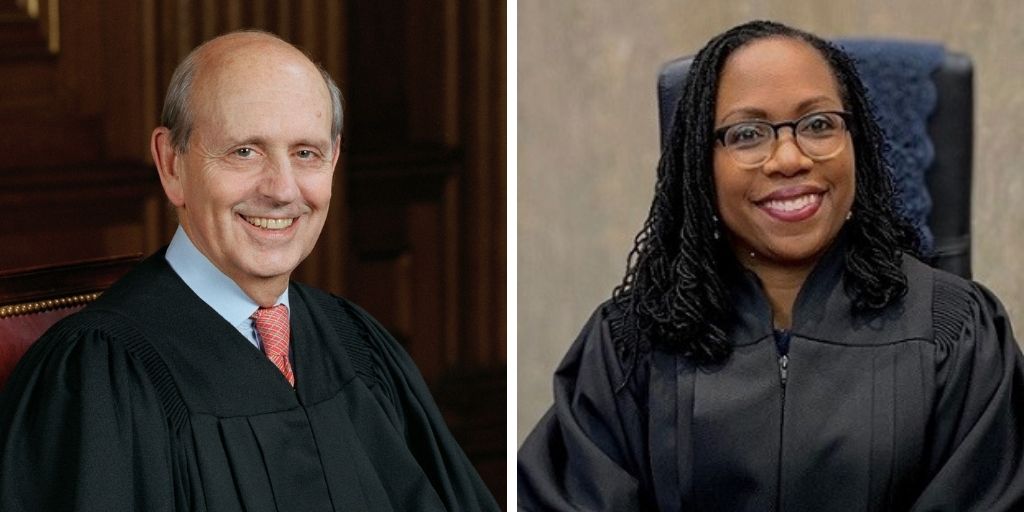
Will Justice Breyer retire at the end of this Supreme Court term? In an op-ed, Black Harvard Law Professor Randall Kennedy explains why Justice Breyer should retire at the end of this Supreme Court term. Many Democrats cite Justice Ginsburg’s refusal to retire during the Obama administration, as she later passed away during President Trump’s term and he replaced her with Amy Coney Barrett.
During his campaign, President Biden promised to appoint the first Black woman to the U.S. Supreme Court. If Justice Breyer does retire, DC Court of Appeals Judge Ketanji Brown Jackson—who previously clerked for Justice Breyer—is a leading contender for elevation to the U.S. Supreme Court.
Economic Studies
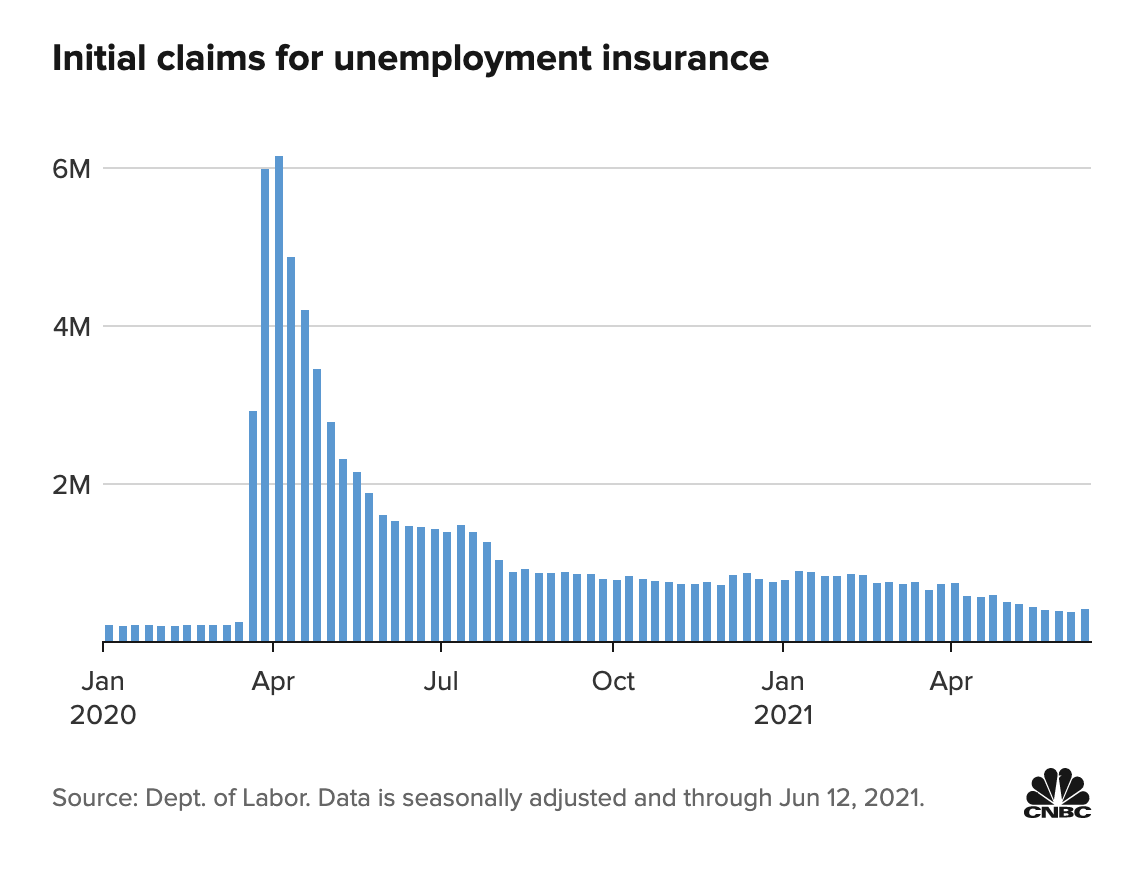
Jobless claims rise slightly: Initial unemployment claims totaled 412,000 for the week ending June 12, increasing by 37,000 from the previous week.
McKinsey chronicles $220 billion M.I.A. for Black communities: A McKinsey simulation documents a $220 billion annual disparity between Black wages today and what they would have been if Black workers were fully represented in all occupations and if pay gaps were eliminated. The report explores the drivers and solutions to Black-white wage gaps.
SBA here to help: New SBA Administrator Isabella Casillas Guzman highlights how the Small Business Administration plans to help older entrepreneurs and entrepreneurs of color in finding training, capital, and business opportunities with the federal government, Market Watch reports.
Lawsuit puts pause on restaurant relief: The SBA disclosed in a recent court filing that it has stopped processing restaurant relief applications submitted by socially disadvantaged groups, which include some business owners of color, The Counter reports.
CDFIs get funding for small businesses: Vice President Kamala Harris and Treasury Secretary Janet Yellen announced that Community Development Financial Institutions (CDFIs) will receive $1.25 billion in federal COVID relief funding to help minority-owned, small, and disadvantaged businesses.
Tech Policy
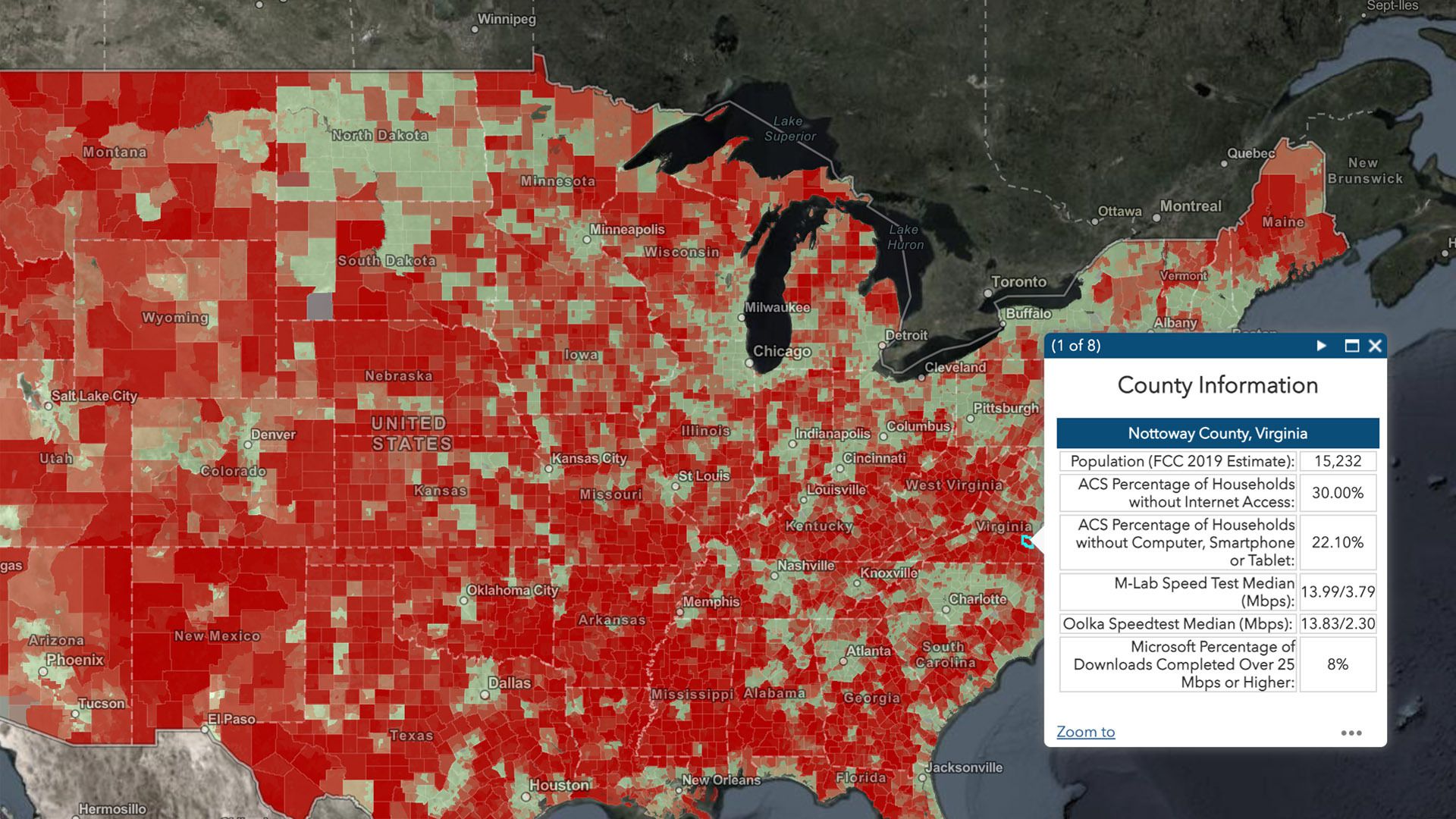
Slower than thought: The White House unveiled a new mapping tool from the National Telecommunications and Information Administration (NTIA) that shows greater gaps in high-speed internet service than the Federal Communications Commission (FCC) found using data provided by internet service providers. Robust, accurate, disaggregated data is vital to expand broadband to communities that need the most help.
HBCUs get help with broadband: A new FCC program will provide $268 million to expand broadband at eligible HBCUs and other minority-serving higher education institutions. The Commerce Department issued the Connecting Minority Communities final rule on June 15. HBCUs are often anchor institutions for their geographic areas and are an integral component of the broadband ecosystem.
Low-income households lose NYC broadband battle: A U.S. District Court judge has blocked New York’s state law requiring internet service providers to make $15-per-month broadband plans available to low-income households, Ars Technica reports. Judge Denis Hurley found that the plans were a form of rate regulation, which is banned. Nationally, affordability is one of the primary reasons that Black families do not have broadband.
Tech support after “racial awakening”: Forty-two technology companies have pledged nearly $3.8 billion in support of diversity, equity, and inclusion in the past year. The support includes $2.86 billion for Black-owned businesses, $422.5 million for racial justice, and $282.5 million in loans and deposits in Black-owned banks, Fast Company reports. However, Big Tech’s pledges after the murders of George Floyd, Breonna Taylor, Ahmaud Arbery, and others have not equated to equity and diversity within their organizations or products that do not disproportionately harm Black people.
Wresting control of AI: Advocates are challenging major tech companies’ once undisputed control over artificial intelligence, MIT Technology Review finds. Blacks in AI and other groups are pushing Google and others to adopt a more equitable, inclusive, and people-focused approach to the research, development, and application of AI.
A mortgage thumb on the scale: A study using real-time mortgage data reveals that the predictive tools lenders use in mortgage application decisions are less accurate for Black people and members of other minority groups, MIT Technology Review reports. The authors of the study experimented with “predictive algorithms to show that credit scores were not simply biased but ‘noisy,’ a statistical term for data that can’t be used to make accurate predictions.” Research shows that African-American and Latina/o borrowers pay 7.9 basis points higher interest rates for home purchases and 3.6 basis points higher rates for refinanced mortgages because of discriminatory financial technology (FinTech) algorithms.
Criminalize voter suppression: Holding tech platforms criminally liable for suppressing the vote could be a way to fight misinformation online, Wired argues. The For the People Act of 2021 would expand platform liability by criminalizing voter suppression “mak[ing] it a federal crime to make false statements concerning the ‘time, place, or manner’ of an election, the ‘qualifications for or restrictions on voter eligibility,’ or public endorsements.” Joint Center President Spencer Overton has testified to Congress about holding social media companies accountable for using data collection and algorithms to target Black voters with suppressive ads.
Future of Work & Learning
Don’t tinker at the edges: Missing in Biden’s $1.2 trillion investment in higher education is a focus on transforming the system (not just its individual parts), argues John MacIntosh of SeaChange Capital Partners in Inside Higher Ed. Doing so is key to a successful and sustained recovery, he says, and is necessary to bolster the effectiveness and stability of at-risk institutions, which 19 percent of Black undergraduate students attend.
Unions can close the pay gap: Unions are a key factor in closing pay gaps between public- and private-sector jobs, the Economic Policy Institute finds. Narrowing inequities in public-sector pay would benefit Black workers, who are overrepresented among local government workers.
Black workers aren’t moving up in jobs: Black women have some of the lowest upward mobility rates in jobs, at only 43 percent (versus 57 percent for white men), a Brookings Institution study finds. In the manufacturing sector, Black workers’ upward mobility is 14 percentage points lower than white workers’.
Loan forgiveness benefits Black families most: New research finds that Black families would be the biggest beneficiaries of student loan forgiveness. Canceling $50,000 in student debt across the board would eliminate more than $17,000 of debt per person among the lowest net worth Black households. Among the highest net worth households, it would eliminate just $562 per person. The Roosevelt Institute study challenges the argument that student loan forgiveness would largely benefit wealthier people.
Amazon under fire: Black Amazon employees are accusing the company’s human resources department—and specifically its highest ranking HR executive—of being an obstacle, not an ally, in their efforts to fight racial bias and discrimination on the job, Vox reports. Last month, Amazon told Recode “that it was ‘conducting thorough investigations’ in light of the lawsuits, but that it had ‘found no evidence to support the allegations.'”
COVID-19
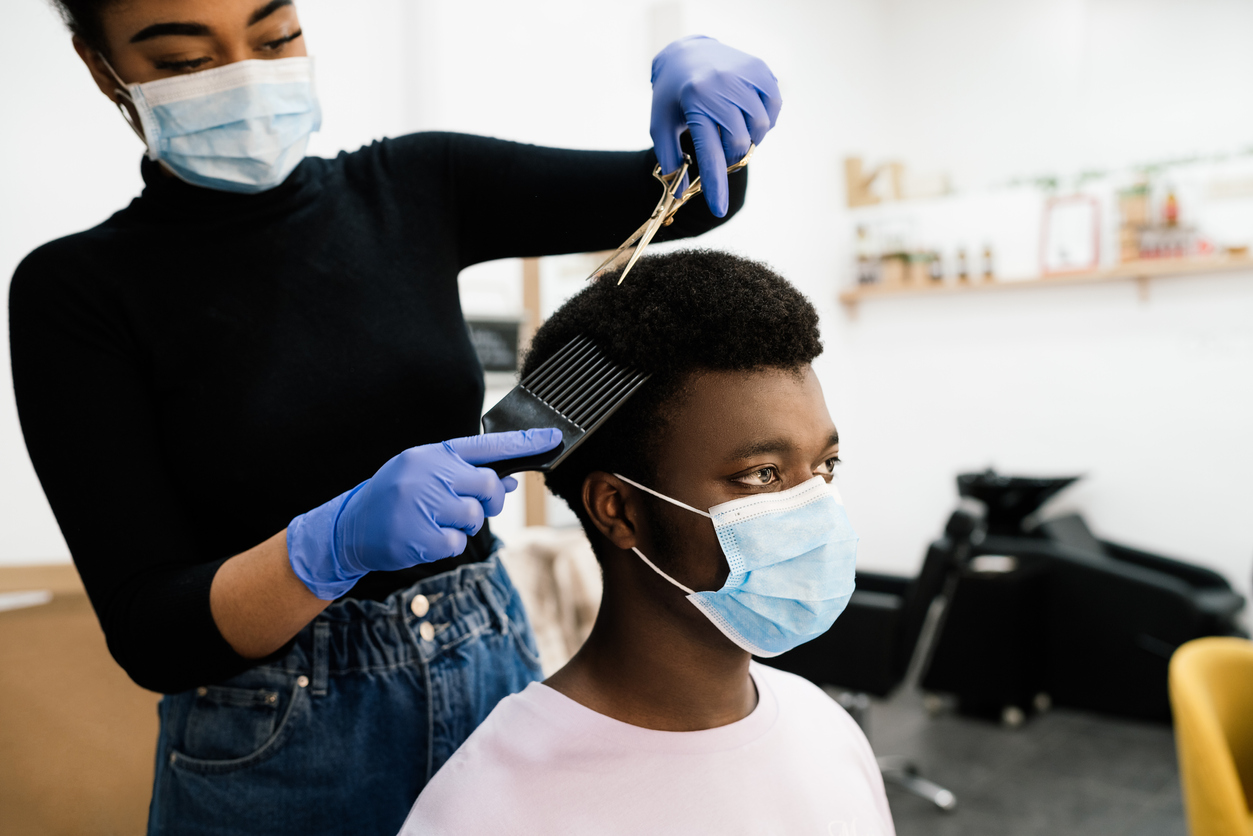
Vaccination push moves to salons: The White House has launched a new vaccination push with Black hair salons. Shots at the Shop is a joint effort with the Black Coalition Against COVID, SheaMoisture, the University of Maryland Center for Health Equity, and the White House’s COVID-19 response team. Only 32 percent of Black people have been vaccinated compared to 45 percent of white people.
July 4 goal fades: White House officials won’t say whether the U.S. will meet President Biden’s goal of vaccinating 70 percent of adults by July 4, The Hill reports. According to CDC data, 64.7 percent of American adults have received at least one dose of the vaccine, but state-to-state variation remains stark.
Harris urges Georgians to get vaccinated: Vice President Kamala Harris visited Georgia, where vaccination rates have fallen below the national average, to urge residents to get their shots. Harris appeared at two prominent Black institutions in Atlanta, Ebenezer Baptist Church and Clark Atlanta University.
Substandard care drives mortality disparities: A new study calls out a segregated hospital system as a significant cause of higher COVID-19 mortality among Black people, even after adjusting for health risks.
Black New Yorkers at risk: The lifting of COVID restrictions in New York City coupled with the new Delta variant could put Black New Yorkers at risk. Only 31 percent of the city’s Black residents are at least partially vaccinated, New York Magazine reports, less than half the rate statewide.
Political Studies
Black elected women face harassment: Although a record number of Black women have been elected to public office, they continue to face harassment, threats, systemic racism, and sexism at all levels of government once in office, PBS NewsHour reports. Black women were 84 percent more likely than white women to be mentioned in abusive or problematic tweets aimed at female journalists and politicians.
AOC pushes for better staff pay: In an effort to increase diversity on Capitol Hill, Rep. Alexandria Ocasio-Cortez (D-NY) led 110 of her congressional colleagues in pushing for a 21 percent increase in salaries for congressional staffers, HuffPost reports. The Joint Center finds that while people of color make up about 40 percent of the U.S. population, they accounted for only 11 percent of top staff in Senate personal offices in 2020 and 13.7 percent of top staff in House personal offices in 2018. African Americans make up about 13 percent of the U.S. population but comprised only 3.1 percent of Senate top staffers and 6.7 percent of House top staffers.
Concerned parents or paid critics? A liberal watchdog group reports that Fox News failed to fully disclose that on-air guests lambasting critical race theory had official ties to conservative organizations and causes. The guests were introduced as concerned parents, teachers, and school board members.
Dems won’t take Black votes for granted: Determined to reverse the declining Black Democratic vote, party strategists say that they are committed to doing more to engage Black and other voters of color. Data reveals that the Black vote for President Biden in 2020 was 3 percentage points lower than it was for Hillary Clinton in 2016.
Movement Building
Black Futures Lab celebrates Juneteenth with a screening of Soundtrack for a Revolution, a film about the connection between history and connection of music and the Black freedom movement.
Color of Change issues a campaign to call representatives and tell them to co-sponsor and “bring H.R. 40 to a full house vote before the congressional recess in August.”
The Congressional Black Caucus will celebrate its 50th anniversary with the National Archives Foundation on June 28. Featured guests include CBC Chair Congresswoman Joyce Beatty (D-OH), House Majority Whip Clyburn (D-SC), former Secretary of Transportation Rodney Slater, and former Governor of Michigan, Jim Blanchard. The celebration will highlight the “caucus’s growth over time, the members who have risen to positions of prominence, and the power of the Black Caucus in driving the legislative agenda in Congress.”
The Leadership Conference for Civil and Human Rights issues a campaign to demand support for H.R. 40 and address the history of slavery and racial discrimination in the U.S.
Events
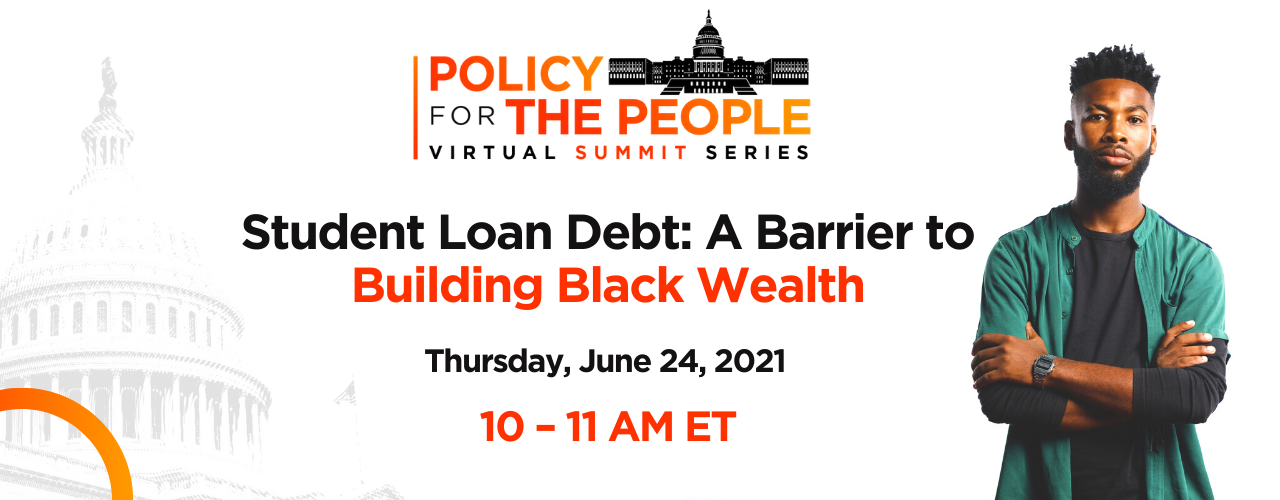
Upcoming events include “Student Loan Debt: A Barrier to Building Black Wealth” (Congressional Black Caucus Foundation, June 24); “Prioritizing an equitable recovery for Black and Brown workers: How states and local communities can utilize ARPA funding to advance worker, racial, and gender justice” (Economic Policy Institute, June 24); “What Do Trade and Manufacturing Have to Do with Racial Justice?” (The Century Foundation, Groundwork Collaborative, and Urban Manufacturing Alliance, June 24); “Policy Summit 2021: Pathways to Economic Resilience in Our Communities” (Federal Reserve Bank of Cleveland, June 23-25); “How Can Retail Businesses Help Frontline Workers Advance?” (Urban Institute, June 28); “Black Women Best Webinar” (SEAP, SouthStrong and Groundwork Collaborative, June 29); “Black livelihoods and economic recovery in the United States” (McKinsey, July 22).
Last week, events were held by the Brookings Institution, Center for American Progress, Economic Policy Institute, Firelight Media, National Urban League, Washington Center for Equitable Growth.
Podcast
Is Biden’s Americans Job Plan the Beginning of a Tech New Deal? (Brookings Institution)
The Joint Center thanks the Annie E. Casey Foundation, the Boulé Foundation, the Democracy Fund, Toyota Motor North America, Inc., UPS, and the Walmart Foundation for additional support that has allowed us to do some of our COVID-19 and Black Communities work.
To receive the Joint Center’s emails, sign-up here.

